A Turtle Mess!
Turtles may have survived the natural disasters that wiped out dinosaurs, but in today’s times they face novel dangers due to human activities. These threats encompass a surge in demand for pet turtles, substantial habitat loss due to shifting land use patterns and climate change. As a consequence, turtles are under immense pressure unlike anything they have experienced before.
This is proven by the high number of deserted turtles and tortoises that RESQ CT, our wildlife center in Pune, India, has received in recent years. On World Turtle Day, a day to contemplate the crucial role of turtles in our ecosystem and advocate for their conservation, we propose a single slogan that we should all embrace and disseminate to aid thousands of these magnificent creatures: "I shell not keep a turtle as a pet!"
Why should we avoid keeping turtles as pets?
Turtles and tortoises, with their unique traits and tranquil demeanor, have often been sought-after exotic pets. Nevertheless, it's crucial to realize that these animals are unfit for domestic life for various reasons.
- Turtles aren’t easy pets.
Turtles and tortoises demand specific dietary and environmental needs that are hard to mimic at home. For instance, they require certain temperature, humidity, lighting, and space conditions to stay healthy. It can take people months or even years to realize the harm caused by improper housing or nutritional deficiencies. This often leads to abandonment or the animal dying prematurely, suffering in silence.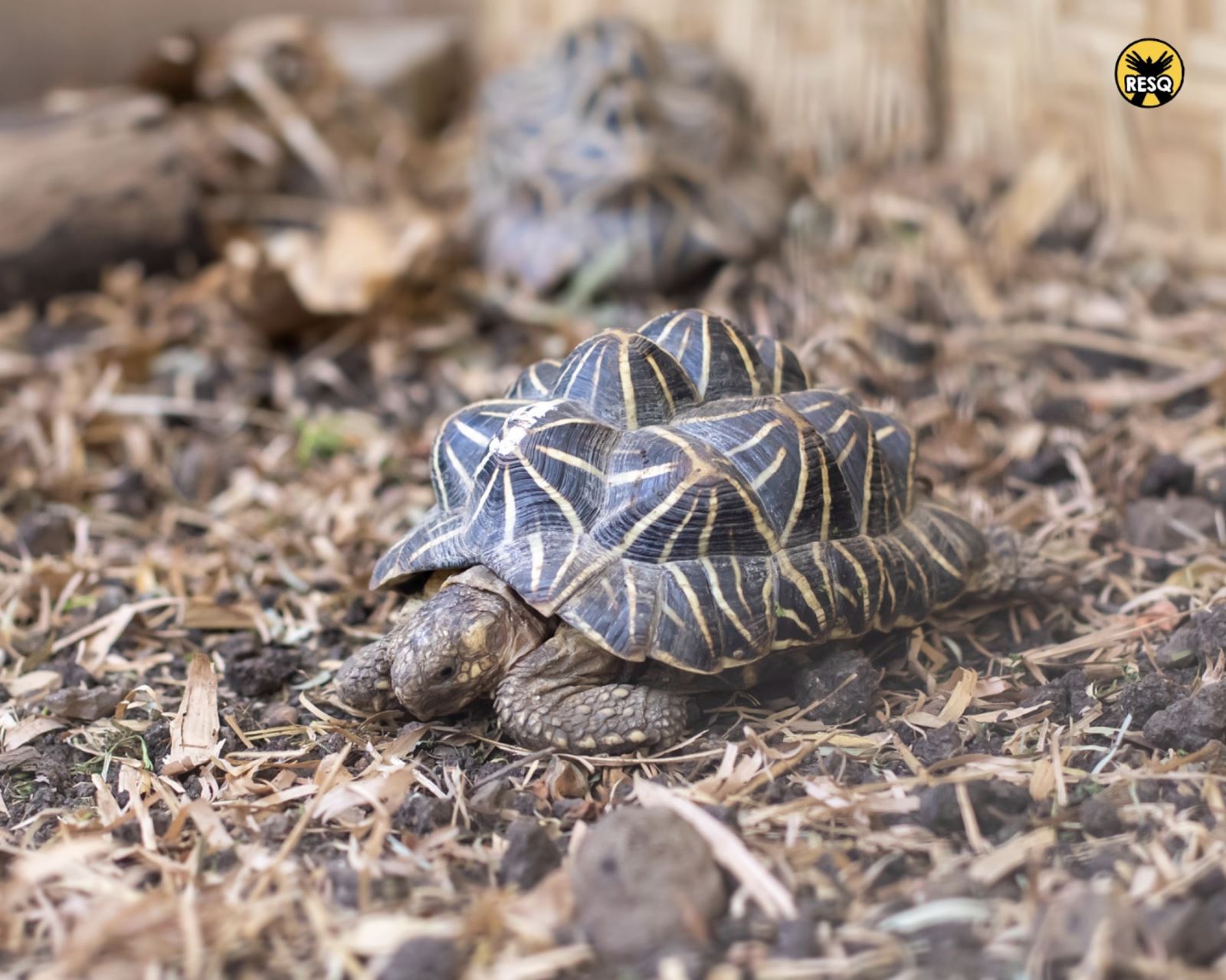 This tortoise at the RESQ Centre, which was rescued from captivity, displays a deformed shell, caused by 'Metabolic Bone Disease' (MBD). This common condition among captive turtles and tortoises, like osteoporosis in humans, occurs due to an imbalance in calcium, vitamin D, and phosphorus intake. A poor diet can lead to deformities, restricted movement, discomfort, and even death.
This tortoise at the RESQ Centre, which was rescued from captivity, displays a deformed shell, caused by 'Metabolic Bone Disease' (MBD). This common condition among captive turtles and tortoises, like osteoporosis in humans, occurs due to an imbalance in calcium, vitamin D, and phosphorus intake. A poor diet can lead to deformities, restricted movement, discomfort, and even death.
- It's illegal to keep most turtle and tortoise species! The Wild Life Protection Act, 1972 protects every native turtle and tortoise species found in India. With the recent Wild Life (Protection) Amendment Bill, 2022, now in effect, most are under Schedule I protection, equal to the protection a tiger receives. Think of it this way - the repercussions of keeping the commonly traded ‘Indian star tortoise’ as a pet is equivalent to keeping a tiger at home.
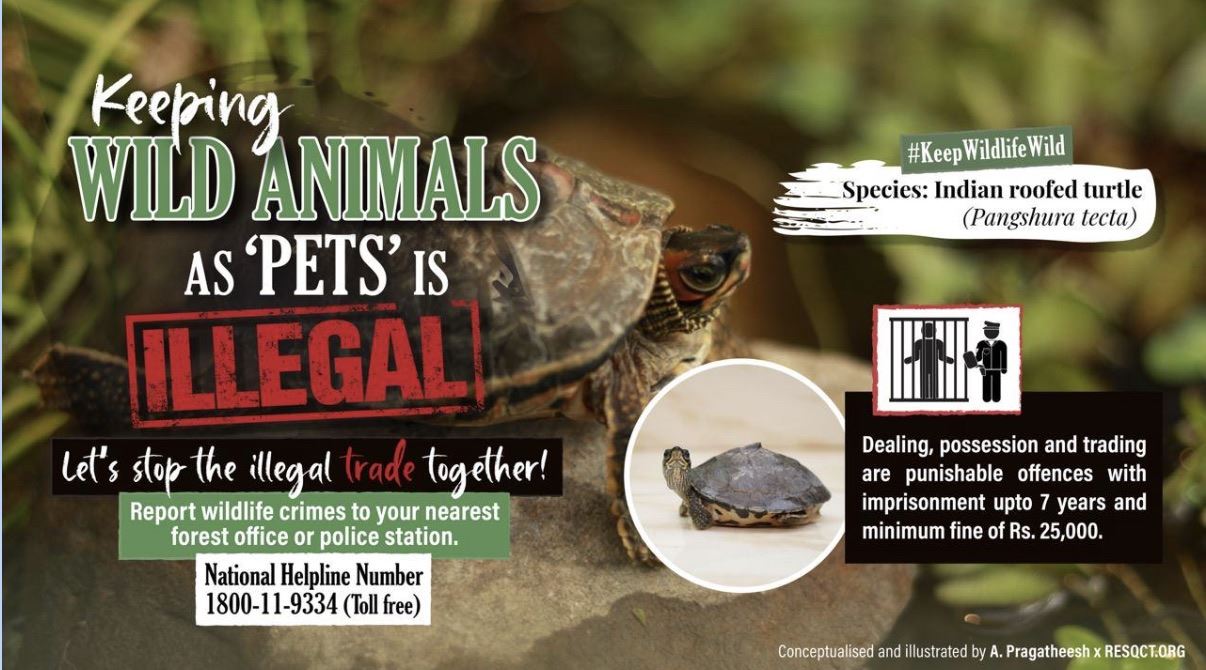
It is illegal to keep Indian turtles and tortoises as pets, period.
- Do you really want to support the illegal exotic pet trade? This trade has caused a surge in the illicit capture and sale of wild turtles and tortoises, threatening their survival, and leading to their cruel and inhumane treatment of these animals once captured.
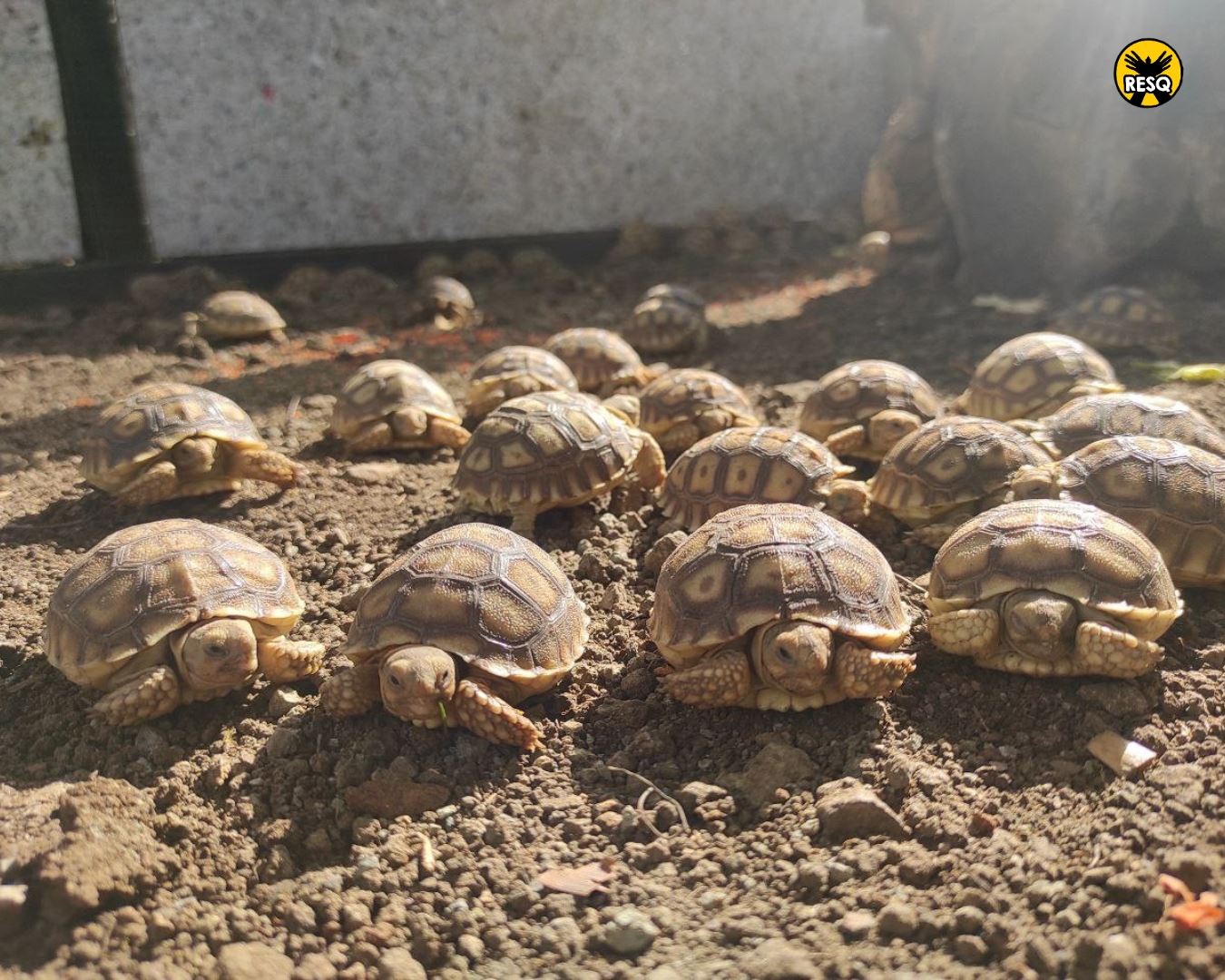
Over 300 African Sulcata Tortoises were rescued by the Railway Police Force in Maharashtra from being transported for the illegal pet trade. They were then sent to RESQ for rehabilitation.
- Threat to native biodiversity
The Red-eared Slider, an exotic turtle species from the United States, greatly threatens India's biodiversity. These turtles, often bought as pets, are abandoned in local water bodies when they grow too large or become difficult to care for. Once released into water bodies inhabited by native species, they become invasive, outcompeting local species for resources as they are hardy survivors, equipped with a broad dietary range and high reproduction rate, enabling them to flourish in diverse environments.
A recent incident highlights this issue. At Bhor Taluka, Maharashtra, the forest department was approached by concerned temple authorities as they noticed that turtles that people had abandoned in the pond structure inside the temple were looking sick and that they had noticed several dying as well. The RESQ CT team was called in by the forest department to assist in extracting them out safely and admitting them in our centre for further care. It was a challenge to remove the turtles from the pond but after an arduous effort that took us over 10 hours, we rescued 99 turtles – a turtle mix of exotic red eared sliders, Indian flapshell turtles, Indian roofed turtles, and Leith’s softshell turtles!
Needless to say, it was our native species that were in far worse condition, as they had taken a severe beating from the tough exotics. They were in dire conditions with severe injuries and in overall poor health, clearly overwhelmed by the aggressive dominance of the exotic red-eared sliders on the minimal resources available in the artificial pond.
How did any turtle get inside an artificial pond inside a temple? No prizes for guessing that one!
Photo captions:
Rescue operation at the temple by Bhor Forest Department and RESQ.
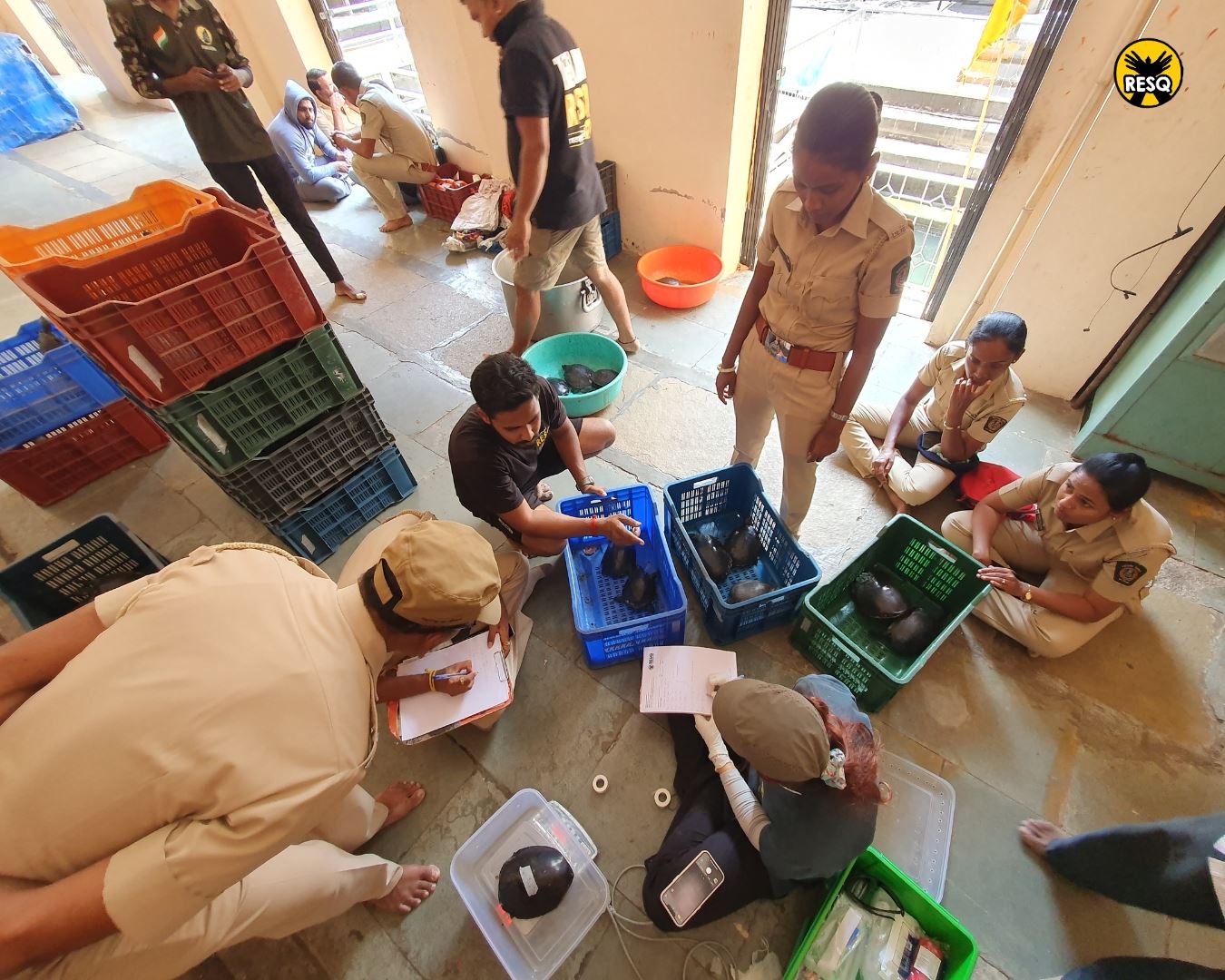
Turtles segregated and quarantined at RESQ CT.
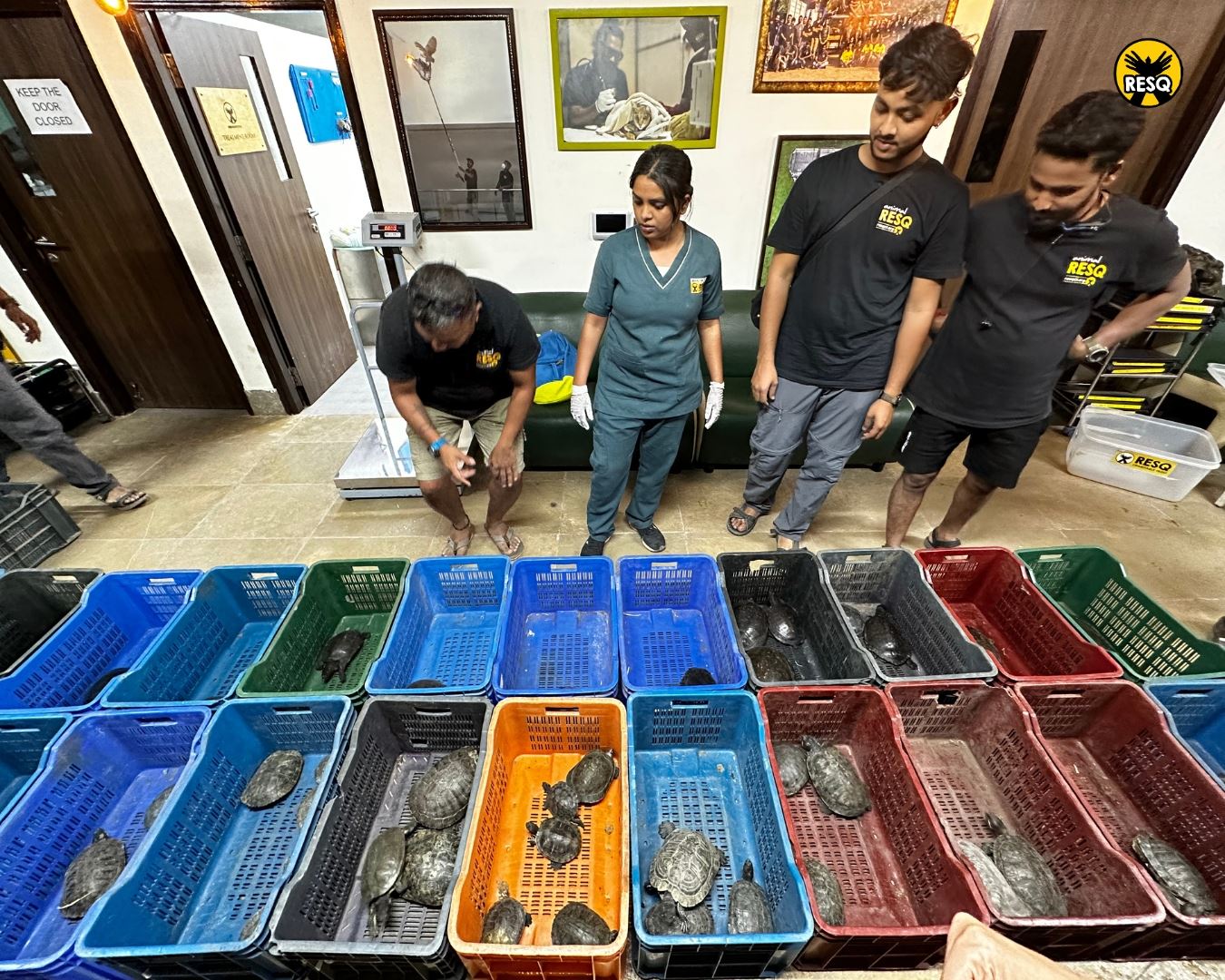
4 species under treatment at RESQ CT.
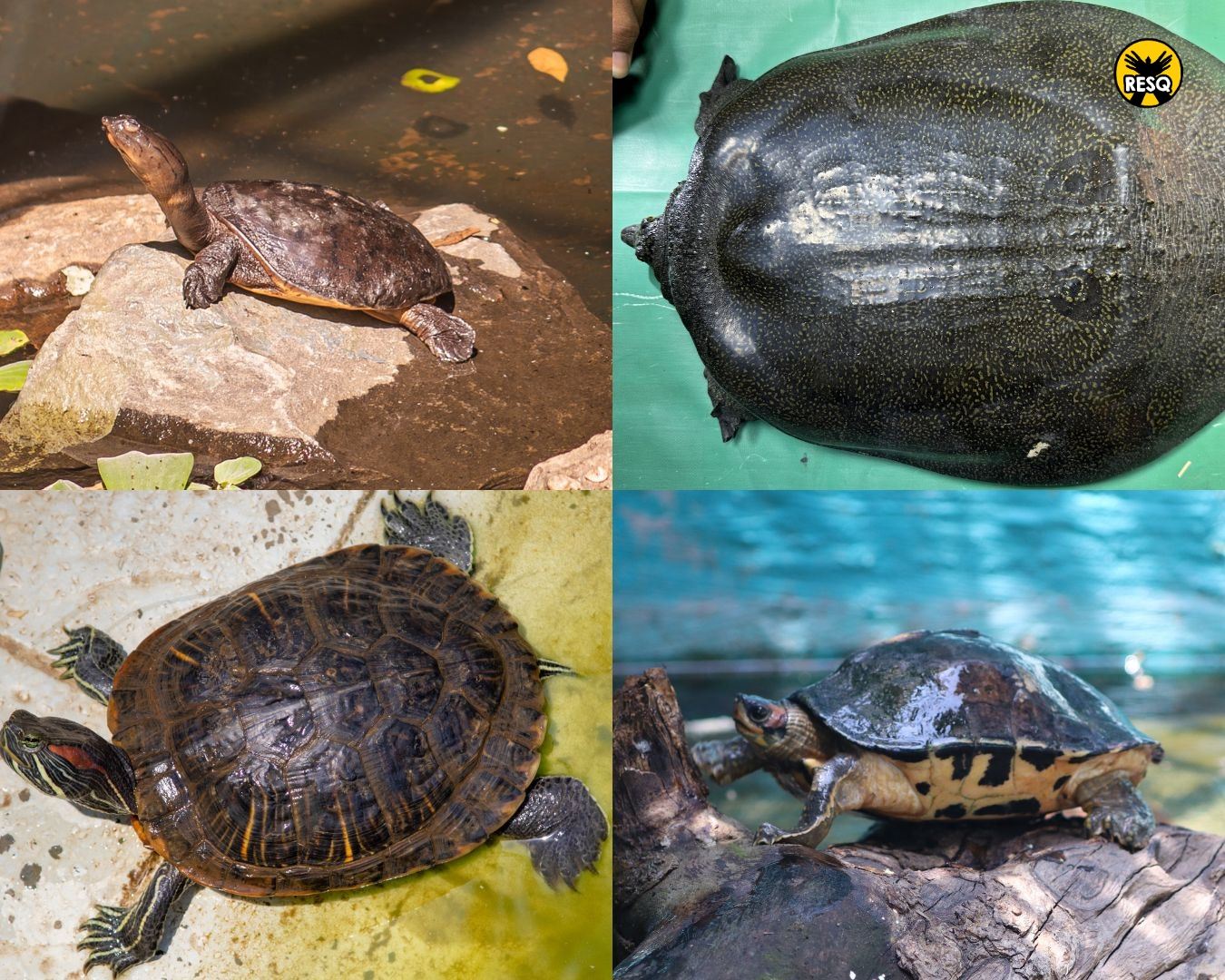
The exotic turtles have been housed in a secure water body away from the native species and our Indian ones are still under quarantine and rehabilitation care. Our veterinarians and rehabbers are closely monitoring their progress, providing them with the necessary medical treatments and a suitable environment. The ultimate goal is to ensure their full recovery before they can be safely reintroduced into a natural habitat.
- Health risk. It's also worth noting that turtles are known carriers of Salmonella, posing a health risk, particularly to young children and those with compromised immune systems. Most animals do not show disease symptoms until they really deteriorate, and since you really do not know the history of the animal you are getting and what infections they may be carriers of – you may want to rethink buying a pet turtle or tortoise for your child!
Tortoise, previously an illegally captive pet, under treatment for an infectious viral disease at the RESQ Centre.
.jpg)
- Turtles and tortoises can outlive you. Some turtles and tortoises have a lifespan exceeding 50 years, making them a long-term commitment that many people may not fully anticipate. The myriad of turtles incoming into the RESQ centre is an indicator of how crucial it is to shed light on the importance of responsible pet ownership, especially when it comes to turtles. It is essential for individuals to understand that owning a pet, regardless of its species, entails a lifelong commitment to the animal's well-being. Turtles, in particular, require specific care and habitat considerations to thrive. Abandoning these creatures not only leads to their suffering but also disrupts ecosystems when invasive species, like the red-eared sliders, overpower native wildlife.
Preserving biodiversity is not only crucial for the well-being of our planet but also essential for the future sustainability of our natural world. While we do our bit at RESQ in trying to spread the word about turtle conservation with the hope of preventing them of getting into trouble in the first place, our hands are almost always full providing rehabilitation care to the bale of turtles currently at our center.
You can help by doing your bit by raising awareness among people, pet owners, and pet trade industry about the ecological consequences of releasing exotic turtles and providing information on alternative options such as surrender programs or finding suitable homes for unwanted pets. And if you know someone who is planning to get a turtle, share this video with them!